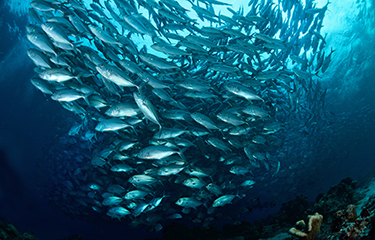The top 5 most-read stories on SeafoodSource involving the environment and sustainability were generally negative for the seafood industry.
The impacts of climate change were clear for some species, while others continue to face threats from both overfishing and illegal, unreported, and unregulated fishing. In some cases scientists are researching solutions, and in others they’re trying to figure out what’s causing population collapses.
Number 5: NOAA investigating declines in chinook, chum salmon runs in Alaska
The National Oceanic and Atmospheric Administration is investigating why the U.S. state of Alaska has had poor chinook and salmon runs in recent years.
Research by NOAA found poor diet, changes in metabolism, and an increase in parasitic infection among chinook have likely contributed to bad runs on the Yukon and Kuskokwim rivers for the previous two years. Those factors, coupled with warmer water temperatures, have had a sharply negative effect on the species.
The communities impacted by the poor fishing led U.S. Secretary of Commerce Gina Raimondo to declare fishing disasters there, and in a number of other fisheries in the state.
Number 4: North American lobster, Canadian snow crab downgraded to “avoid” by Monterey Bay Aquarium Seafood Watch
In September, Monterey Bay Aquarium Seafood Watch released a new set of updated seafood ratings that placed North American lobster and Canadian snow crab in the “avoid” category, primarily due to potential impacts the fishery could be having on North Atlantic right whales.
The updated ratings were immediately condemned by the industry and by federal representatives of the U.S. state of Maine, with U.S. Senator Angus King and U.S. Representative Jared Golden introducing a bill to pull federal funding from the Monterey Bay Aquarium in response to its decision to red list Maine lobster.
The decision also contributed to a decision by Whole Foods to curtail sales of Maine lobster.
Number 3: Moroccan octopus mafia accused of IUU fishing resulting in 60 percent population decline
A report by Morocco’s National Institute for Fisheries Research indicated the nation’s cephalopod catch was down 60 percent – and the industry attributed the decline to poaching by an “octopus mafia.”
Lax enforcement on a fishing ban during a biological rest period, and longstanding smuggling issues, continued unabated, according to the industry.
In response to the decline in the local octopus stock, a select committee of professionals and members of the Moroccan Ministry of Fisheries was created during the commission meeting to recommend countermeasures to combat illegal fishing and sales of octopus, and the commission on 25 May, 2022, decided to formally request government intervention to prevent illegal fishing during the current fishing moratorium.
Despite the moratorium, the media publication Le Reporter reported that cold-storage facilities in Morocco continued to buy octopus and were full.
“What we are asking for is strict control, and above all, urgent intervention by all the authorities concerned,” Moroccoan Secretary General of the National Confederation of Coastal Fisheries Mohamed Allalou said. “Because the more this mafia gets involved in illegal octopus fishing, the more difficult it is to put an end to this problem.”
Number 2: Chinese fishing vessels involved in standoff with U.S. Coast Guard on the high seas
Over the summer, a U.S. Coast Guard cutter ended up in a standoff with a Chinese vessel not far from Ecuador’s Galapagos Islands.
The Coast Guard was there to inspect vessels in an extensive Chinese distant-water fishing fleet for evidence of illegal, unreported, or unregulated fishing, via the legal boarding of the vessels for inspection. Instead of submitting to inspection, however, some of the ships in the fleet sped away, and one vessel threatened to ram the Coast Guard cutter.
The Coast Guard’s efforts in the area came during its first-ever mission to counter illegal fishing in the eastern Pacific. The Galapagos Marine Reserve has been the subject of contention in recent years as Chinese vessels continue to fish in international waters near the islands.
Number 1: Scientists warn of fisheries collapse in East and South China Sea
China’s demand for aquaculture feed has driven overfishing in the East China Sea and South China Sea, a scientific report said.
Rising ocean temperatures as a result of global warming will be particularly ruinous to fishing stocks in the South China Sea, according to the report, “Sink or Swim: The Future Of Fisheries In the East And South China Sea,” which was compiled by fisheries scientists and economists from the University of British Columbia as well as the University of Hong Kong with backing from the ADM Capital Foundation.
According to the report, immediate action to reduce fishing effort is needed to prevent a total collapse of fisheries in the region.
Photo courtesy of think4photop/Shutterstock







